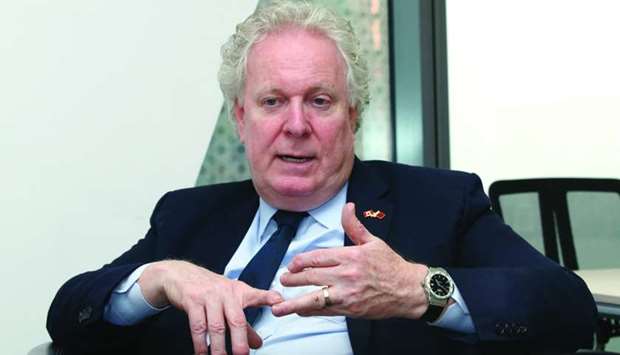*Canada firmly believes in Qatar; looks to enhance two-way trade, says former Canadian deputy PM
Canada is negotiating a Foreign Investment Protection and Promotion Agreement (FIPPA) with Qatar, which aims to accelerate investment flows between the two countries and provide a new impetus to bilateral economic ties.
“Qatar is very important to Canada; Qatar is very high on Canada’s policy of trading more with the Middle East region,” said Jean Charest, Canada’s former deputy prime minister.
“It is a prelude to a trade agreement, really; we have been negotiating a lot of them all over the world. It gives us a basic framework of rules for protecting investments. We are negotiating a FIPPA agreement with Qatar,” Charest told Gulf Times in an exclusive interview.
Asked whether FIPPA would pave the way for a free trade agreement with Qatar one day, Charest said, “It could very well…why not? There is no reason, why we should not.”
He said, “Canada is a trading nation and trade is geography. If we want to trade beyond geography, you have to make a conscious effort to do that. It has to be a deliberate effort; you have to put resources behind that. That’s where we are heading to.”
Charest said he is visiting Qatar to “talk business opportunities between both our countries and our businesses and to seek to generate interest to enhance those relationships.”
“With regard to the future of the GCC region, Canada firmly believes that Qatar has great importance. I have met your minister of economy and commerce as well as top officials of the Qatar Investment Authority, besides the representatives of the Qatar Chamber,” said Charest, who has been mandated by the Canadian government to enhance trade ties with the Middle East.
But, Charest said, “Our bilateral trade is underdeveloped (as of now). We should enhance it. The total two-way trade between Canada and Qatar accounted for only $210mn in 2016. This is very weak.”
Putting this into perspective, the Canadian leader said, “Every day, we do trade worth $1.7bn with the United States. The numbers are absolutely huge.”
Charest, who was also a former premier of Quebec said, “Qatar is very high on Canada’s trading list as the country looks to engage more with the Middle East. Here in the Middle East, Canada has not been consistent in its presence. We want a stronger presence in the region. We want to do more and trade more… and Qatar is very high on our list.”
He sees several areas where enhanced co-operation is possible between Canada and Qatar.
“In oil and gas, there is space for us to co-operate. This is because both of us are energy-rich and have expertise and people. The other potential areas include infrastructure spending, investment, healthcare, agriculture, food processing, technology and banking and finance,” he said.
Highlighting the recent creation of Canada Infrastructure Bank, Charest said, “We have invested $35bn solid money in this bank. The projects the bank invests in will contribute to our long-term economic growth and support the creation of good, well-paying jobs for the middle class. We are looking at partners who are interested in associating with infrastructure projects in Canada. Our banking system is strong and very well-regulated.”
He emphasised that “Canada is very reliable, very predictable and has very strong institutions. Our stock markets are very vibrant and provide good investment opportunities.”
He said the Canadian Business Council Qatar, which was formally launched in Doha recently, would provide a fillip to the bilateral relationship between the two countries.
Canada, Charest said, has strong belief in Qatar’s ability to proceed ahead in its strategic plans, particularly in economic diversification.
Canada is a hugely trade-based country, he said, and added that it is an “outstanding destination” for investment.
Although the two-way trade between the US and Canada is still huge, Charest said, “We want to diversify that particularly because of President Trump’s policies vis-à-vis Nafta and the TPP. 70% of our exports still go to the US-we want to diversify that.
“We have just signed and implementing a trade agreement with Europe. It is the most advanced trade agreement in the world and it is being implemented in September this year. A deal is also being worked out with the remaining 11 TPP members including Canada and that is also part of our diversification.”


